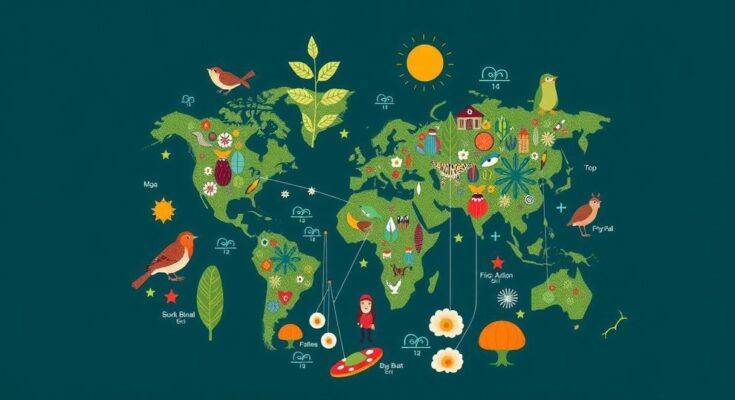COP16, scheduled for October 21 to November 1, 2024, in Cali, Colombia, aims to unify efforts against biodiversity loss and climate change. The International Fund for Animal Welfare (IFAW) calls for integrated strategies, highlighting the critical role of marine biodiversity. They urge that international commitments, especially from the COP28 Joint Statement, be reflected in the conference outcomes, setting a precedent for future environmental negotiations.
The 16th Conference of the Parties (COP16) to the United Nations Convention on Biological Diversity (CBD) is set to take place from October 21 to November 1, 2024, in Cali, Colombia. As global leaders and environmental specialists convene, the International Fund for Animal Welfare (IFAW) emphasizes the urgent need for coordinated international effort to address the dual crises of biodiversity loss and climate change. IFAW’s Senior Director of Policy, Matt Collis, articulates, \”We cannot address the climate crisis or biodiversity loss without considering the other. COP16 is a critical juncture to ensure that our efforts complement one another and establish a foundation for future endeavors.\” Positioned as the first of the interlinked Rio Convention COPs of 2024, COP16 is expected to influence subsequent environmental negotiations, particularly as nations prepare to update their climate action plans for the United Nations Framework Convention on Climate Change (UNFCCC) COP30. The COP28 Joint Statement on Climate, Nature, and People underscores the necessity of an integrated approach to these challenges. IFAW urges the participants at COP16 to incorporate these commitments into the summit’s final outcomes, particularly in the high-level segment and the Cali Declaration. Special attention is required for marine and coastal biodiversity, which constitutes a critical asset for both ecosystems and humanity. Marine ecosystems are instrumental in carbon absorption and climate stabilization, yet they face significant threats from human activities and climate change. Collis remarks, \”Healthy oceans are the foundation of a healthy planet. They absorb carbon, mitigate climate impacts, and support rich biodiversity.\” It is imperative that COP16 places the preservation of marine ecosystems at the forefront of its agenda. Collis further notes, \”Time is running out to tackle the intertwined crises of biodiversity loss and climate change. COP16 represents an opportunity for hope. By ensuring that our biodiversity and climate actions are aligned, we can achieve tangible progress. The future of our planet is at stake.\” IFAW will hold an official side event entitled \”Leveraging wildlife conservation and rewilding to supercharge climate mitigation and adaptation\” on October 24 at 16:30 COT. This event will focus on the role of wildlife in combating climate issues and will feature the introduction of new guidelines aimed at integrating wildlife conservation into governmental climate action plans. For additional details, interested parties may visit the official CBD side event page at https://www.cbd.int/side-events/5723.
The Conference of the Parties (COP) facilitates international dialogue among nations regarding biodiversity and climate change. The Convention on Biological Diversity (CBD) seeks to ensure sustainable development while promoting the conservation of biological diversity. The events at COP, especially COP16 in 2024, play a significant role in shaping global policies and commitments toward environmental sustainability. Moreover, this conference is interlinked with the UNFCCC, highlighting the necessity for a holistic approach to combatting climate change and preserving biodiversity as intertwined aspects that require collective action. Marine and coastal ecosystems, which are essential for both wildlife and human societies, have been increasingly threatened by anthropogenic activities, necessitating urgent protective measures.
In conclusion, COP16 represents a unique opportunity for global leaders to emphasize an integrated strategy addressing the crises of biodiversity loss and climate change. With the critical role of marine ecosystems underscored, the conference is a chance to align national and international efforts towards effective environmental stewardship. IFAW’s initiatives and events during COP16 aim to foster collaboration and generate actionable outcomes for both wildlife conservation and climate action.
Original Source: www.ifaw.org




